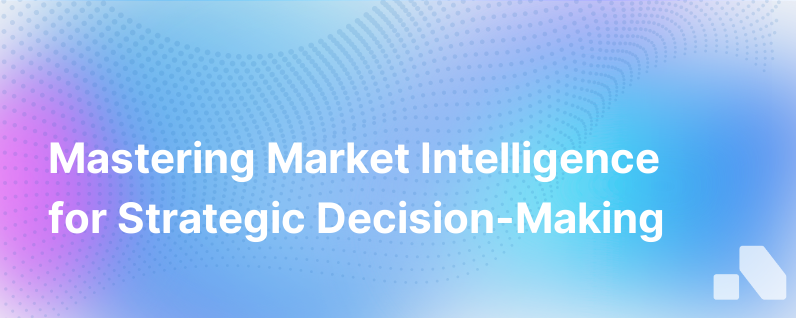
In today's ultra-competitive marketplace, the race to get ahead is intense. Decisions need to be data backed, strategies must be thoroughly verified and opportunities should be carefully evaluated before committing resources. One methodology that consistently delivers value to organizations in this context is a robust and focused market intelligence strategy.
The sheer volume of information available today makes it feasible for companies to have the insights they need to plan, pivot, and perform effectively. However, distilling the necessary information from this abundance is a challenge. This is where market intelligence comes into play. In this piece, we'll explore the concept of market intelligence strategy and how you can effectively utilize it to inform and enrich your business decisions.
Understanding Market Intelligence Strategy
Market intelligence refers to the information relevant to a company's markets, gathered and analyzed specifically for the purpose of making accurate and confident decisions in areas such as market opportunity, market penetration strategy, and market development.
A Market intelligence strategy helps organizations identify the opportunities and risks that will affect their present and future operations. For example, a well-rounded market intelligence strategy can help companies stay ahead of the curve, anticipate customer needs, identify new business opportunities, and stay abreast of competitive developments.
Building a Market Intelligence Strategy
A successful market intelligence strategy is built on both quantitative data (hard statistics and measurable factors) and qualitative data (more nebulous indicators like opinions and motivations) collected from a variety of sources. These sources can range widely from market research, competitive analysis, product intelligence, and even social listening.
Let’s break down the key steps involved in building an effective market intelligence strategy:
-
Identify what you need to know: Before diving into data collection, identify the crucial information required to make your next big business decision. This could be determining potential market size, understanding consumer behavior, evaluating sector trends, monitoring competitors or unveiling business risks.
-
Choose your data sources: Once your information needs are outlined clearly, identify data sources, both internal and external, that will give you the insights you need. These sources could include social media channels, customer surveys and feedback, trade publications, governmental statistics, and competitor metrics, among others.
-
Collection and analysis of data: With your data sources mapped, it's time to start gathering information. Various tools can help streamline this process—from online survey platforms to web scraping tools and social listening software. After gathering the data, critically analyze it to draw meaningful conclusions.
-
Turning data into actionable insights: The most crucial part of a market intelligence strategy is converting your analyzed information into insights that can drive strategic business decisions. It is the articulation of these findings that will guide your business operations.
-
Evaluate and refine the process: Market intelligence is not a one-off process. The nature of your business environment is dynamic and continually changing. Regularly revisit your intelligence strategy, evaluate its results and refine your methodology to stay updated.
Implementing a Market Intelligence Strategy with Aomni
“Data is the new oil” rings true in the era of digital transformation, but too much data can lead to information overload. This is where Aomni's AI platform comes into the picture. Aomni streamlines the entire process by providing real-time account research, actionable competitive insights, and personalized sales content, empowering you to make fast, data-driven decisions.
In less than 15 minutes, the platform can deliver actionable insights, eliminating the need to spend countless hours manually collecting and analyzing data. Aomni also continuously learns and improves based on feedback, ensuring your market intelligence strategy remains agile and effective.
Conclusion
To say that market intelligence is crucial to a business's success would be an understatement in today's competitive landscape. A holistic market intelligence strategy equips you with the invaluable knowledge necessary to understand your business environment, navigate its complexities, and ultimately drive growth.
Augmenting your market intelligence strategy with AI-powered platforms like Aomni fuels robust, dynamic, and competitive decision making, ultimately leading to sustainable business growth.